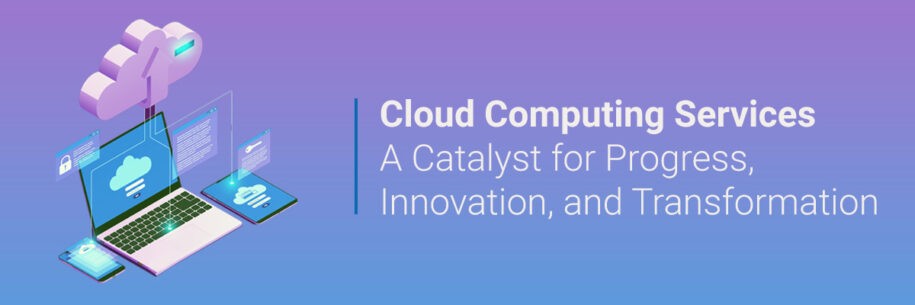Table of Contents
ToggleBlog: Today, cloud computing services have become increasingly popular in recent years as they offer a dynamic, scalable, and cost-effective alternative to traditional IT infrastructure. In the era of digital transformation, the concept of cloud computing has emerged as a game-changer. From storing and analyzing vast amounts of data to hosting websites and applications, cloud computing services have become the backbone of digital innovation.
Cloud computing services have a significant impact on almost every business and facet of modern life. Businesses and organizations are constantly seeking cloud computing services to optimize their IT resources, streamline IT operations, enhance scalability, reduce costs, and stay competitive in a rapidly evolving digital landscape.
What is cloud computing?
Cloud computing is the on-demand delivery of computing services and resources—cloud-based applications, networking, databases, software, analytics, physical and virtual servers, data storage, and development tools—over the internet (“the cloud”). This has enabled businesses to pay only for the cloud services they use, helping them reduce capital expenditure, run infrastructure more efficiently, scale faster, and focus on their core competencies.
Compared to traditional IT infrastructure, cloud computing services save the upfront cost and complexity of owning and maintaining your own IT infrastructure. It offers a wide range of services and resources over the internet by leveraging a vast network of remote servers and data centers operated by cloud service providers (CSPs).
Key characteristics of cloud computing services
Resource pooling: Instead of relying on local servers or personal devices to handle data processing and storage, cloud computing allows multiple users across various locations, devices, and applications to tap into a shared pool of computing resources that are hosted and managed by cloud service providers.
Quickly scalable: Cloud computing enables organizations to quickly scale up or down cloud resources according to changing workloads and demands.
Broader accessibility: Cloud computing services are accessible from a variety of devices, including computers, smartphones, tablets, and others, as long as there is an active Internet connection.
Pay-as-per-use model: Cloud computing is a cost-effective and flexible model that allows the user to pay for only the resources they consume.
The most common types of cloud computing service models
Software-as-a-Service (SaaS): In this type of model, cloud computing services provide a complete software solution on a subscription basis from a cloud service provider. The service provider manages the hosting, delivery, and maintenance of the software and ensures the availability and security of the app and data. Popular examples are email, calendaring, Microsoft 365 productivity tools, and Amazon Web Services.
Infrastructure-as-a-Service (IaaS): Provides virtualized computing resources, such as computing power, networking, and data storage, to users over the internet on-demand. Users can rent these virtual machines, storage, and networking infrastructure on a pay-as-you-go basis. Popular examples of IaaS include Google Compute Engine, Azure Virtual Machines, and Rackspace.
Platform as a Service (PaaS): Offers a complete cloud platform that is hosted by a supplier and includes tools and services for application development, deployment, and management. Users can develop, run, and manage applications without having to manage the underlying infrastructure. Examples include Google App Engine and Microsoft Azure App Service.
Top benefits of cloud computing services:
Cloud computing services offer a wide range of benefits to organizations of all sizes and industries. From reducing infrastructure costs to increasing agility and scalability and protecting sensitive data, cloud computing has become a fundamental technology in the digital age. Here are some of the top benefits of cloud computing services:
Cost savings: Cloud computing eliminates the need to invest in buying hardware and software and setting up and running onsite datacenters. Instead, cloud computing services allow organizations to use cloud services on a subscription or pay-as-you-go basis, helping to optimize IT costs.
Speed: Most cloud computing services are provided on demand or are self-service, so they can be provisioned and deployed in minutes, typically with just a few mouse clicks. This reduces the time taken to launch new applications and services and provides great flexibility for businesses.
Scalability and flexibility: Since cloud computing services are on demand, users can choose services and resources that best fit their specific needs and provision the amount of resources that they actually need.
Innovation and agility: Cloud computing gives organizations access to a wide range of cloud-native services and tools, giving them the ability to innovate faster, differentiate customer experiences, and create new ideas to transform business.
Global reach: With cloud computing services, organizations can expand into new geographies and deploy globally in minutes. Cloud providers have data centers located in multiple regions around the world, allowing organizations to deploy applications across multiple physical locations and in close proximity with just a few clicks, reducing the risk of downtime and data loss.
Security: Many cloud providers invest heavily in security measures, including encryption, access controls, and compliance certifications. This helps protect data, apps, and infrastructure from potential threats.
Conclusion
Using cloud computing services means no more buying servers, updating applications or operating systems, or maintaining your own computing infrastructure. Cloud computing services help businesses rethink business processes, break down any organizational silos, and accelerate digital transformation. As we look to the future, emerging technologies such as artificial intelligence, serverless computing, and edge computing will further expand the possibilities and applications of cloud services.
At Mearas, we deliver a 360° cloud enablement portfolio that includes cloud consulting and strategy, architecture, application design and development, migration, and security. Our complete cloud solution will ensure that your data is seamlessly transformed and leveraged for the cloud system. Call us at- +91 779 8487158. if you would like to know about our cloud computing services.
